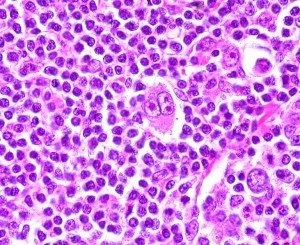August 29th, 2011 by Elaine Schattner, M.D. in News
No Comments »

 Recently, the FDA announced its approval, upon accelerated review, of a new drug, Adcetris (brentuximab) for patients with Hodgkin’s lymphoma that has relapsed after bone marrow transplant and for some patients with T-cell anaplastic large cell lymphoma (ALCL).
Recently, the FDA announced its approval, upon accelerated review, of a new drug, Adcetris (brentuximab) for patients with Hodgkin’s lymphoma that has relapsed after bone marrow transplant and for some patients with T-cell anaplastic large cell lymphoma (ALCL).
This interests me for a lot of reasons, among them that I used to work in the field of lymphoma immunology and spent some time in my life studying molecules like CD30, the protein to which the new antibody binds.
First, a mini-primer on the disease and numbers of patients involved: Read more »
*This blog post was originally published at Medical Lessons*
August 29th, 2011 by Harriet Hall, M.D. in Opinion, Research
1 Comment »

During the early days of the 2009 H1N1 influenza A pandemic, the popular herbal formula maxingshigan–yinqiaosan was used widely by TCM practitioners to reduce symptoms. (It’s hard to pronounce and spell, so I’ll refer to it as M-Y.) A new study was done to test whether M-Y worked and to compare it to the prescription drug oseltamivir. It showed that M-Y did not work for the purpose it was being used for: it did not reduce symptoms, although it did reduce the duration of one sign, fever, allowing researchers to claim they had proved that it works as well as oseltamivir.
“Oseltamivir Compared With the Chinese Traditional Therapy: Maxingshigan–Yinqiaosan in the Treatment of H1N1 Influenza” by Wang et al. was published in the Annals of Internal Medicine earlier this month. The study was done in China, which is notorious for only publishing positive studies. Even if it were an impeccable study, we would have to wonder if other studies with unfavorable results had been “file-drawered.” It’s not impeccable; it’s seriously peccable.
It was randomized, prospective, and controlled; but not placebo controlled, because they couldn’t figure out how to prepare an adequate placebo control. They considered that including Read more »
*This blog post was originally published at Science-Based Medicine*
August 29th, 2011 by Berci in News
No Comments »

I’ve always been a great fan of what Mayo Clinic has been doing on social media. Then after Mayo Clinic Center for Social Media was launched, I became a member of the international external advisory board which I’m very proud of. I reported when they launched a patient community and also discussed how well they did this. Now the Center is 1 year old and still performs perfectly. An excerpt form their previous entry:
Here’s a sneak peek of a few topics that were discussed during Mayo’s retreat: Read more »
*This blog post was originally published at ScienceRoll*
August 29th, 2011 by admin in Better Health Network
No Comments »


I stumbled upon the article ‘Laughter: gender-specific variations’ in Revista Clínica Española (‘Spanish Clinical Journal’) and I can’t help thinking about the need for taking this into account to improve doctor-patient relationships. The text can actually be read as a guide to understand how every person laughs and how to use it in clinical practice.
Table 1. Laughter effect on health Read more »
*This blog post was originally published at Diario Medico*
August 29th, 2011 by Medgadget in Research
No Comments »

Optical Coherence Tomography (OCT) has been demonstrated to be able to differentiate between benign and potentially malignant pancreatic cysts. Researchers from Massachusetts General Hospital, Physical Sciences, Inc., Brigham and Women’s Hospital, and Brandeis University have published their findings in Biomedical Optics Express. In their study they used surgically removed pancreas specimens of patients with pancreatic cysts to assess them with OCT and compare the results with histology examinations. OCT was able to reveal specific morphological characteristics used to differentiate between the low-risk and high-risk cysts. Read more »
*This blog post was originally published at Medgadget*
 Recently, the FDA announced its approval, upon accelerated review, of a new drug, Adcetris (brentuximab) for patients with Hodgkin’s lymphoma that has relapsed after bone marrow transplant and for some patients with T-cell anaplastic large cell lymphoma (ALCL).
Recently, the FDA announced its approval, upon accelerated review, of a new drug, Adcetris (brentuximab) for patients with Hodgkin’s lymphoma that has relapsed after bone marrow transplant and for some patients with T-cell anaplastic large cell lymphoma (ALCL).

















